| CHANGJIN JOURNAL 11.01.02
IN THIS ISSUE we review letters written fifty‐two years ago that
cover the period of early October 1950, when units were in the Pusan
area preparing
for movement to Northeast Korea, until shortly before
RCT 31 received marching
orders to move to the Chosin, a generic term
for what is known today as the
Changjin Reservoir. Letters such as
these serve to provide a chronology of
happenings as well as identify
soldiers involved. In this case many persons
mentioned are members of
3/31 Infantry because the writer happened to have served
in that
battalion shortly before the war and knew most of the officers, as
well as many enlisted men of King Company.
FIFTY‐TWO YEARS
AGO
In 1948 1LT Lucy C. Davis, Army Nurse Corps, and 1LT George
A. Rasula, Infantry, were both assigned to Korea, meeting each other
during a dance
at the XXIV Corps officers club. Their courtship
included extensive tours by jeep
in the Seoul‐Inchon area, as well as
climbing Nam‐San Mountain at
Seoul where they enjoyed viewing the
Land of the Morning Calm.
==========
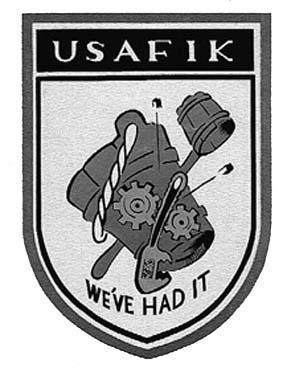
During 1948‐49 a major drawdown of U.S. forces was taking place, the
last
major unit being the 7th Infantry Division, eventually down to
the 32d Infantry
Regiment, the colors of which went to Japan while
the Korea unit then became
the 5th RCT. It was during this time when
the lieutenants would gather over
beer in the evening to discuss and
argue the future of South Korea. The
training aids officer and Lt.
Rasula of the S‐3 section used their
imagination and came up with a
shoulder patch to express their views. When
George sailed off to
Japan to join the 7th Infantry Division, the colors of the
5th RCT
went to Hawaii, not knowing that colors of both organizations
would
return to Korea the following year to verify the logo "We've
had it.
‐Photo by George Rasula
After being transferred to Japan in 1949, they married at the
Tokyo Army Chapel after which Lucy was released from active duty,
then settled in
for the remainder of their tour at Camp Crawford near
Sapporo where George
experienced a winter of great skiing. When the
Korean War broke out in 1950 Lucy
returned to the States and George
went into combat with the 31st Infantry. These
letters were made
possible because of his assignment in the regimental S‐3
section.
Most were typed late at night next to a pot‐belly stove. No
letters
were written between the time the regiment left Untaek until the
morning of 11 December when Cpt Rasula arrived at Hamhung with the
survivors of his
provisional rifle company that had fought out with
the 7th Marines.
The letters have been edited only for clarification of
content, the style
remaining as written 52 years ago.
DEAR LUCY
8 October
1950 (outside of Pusan)
I sure hope we don't move again. I think Gen Hodes
is
supposed to make the decision this afternoon. I wish he'd harass
the
other two regiments for a while and leave us alone. By the way, Col
Ovenshine has been relieved and sent to the Inchon Logistical
Command; we are now
wondering who is going to be our next regimental
commander.
Maj [Berry K.]
Anderson [S‐3] isn't too easy to work for,
although he doesn't
bother me, but he sure does give the liaison
officers a hard time. He has an
attitude that he knows it all and
wants his way all the time. Lieutenants Skilton
and Racek have come
to me quite often with complaints, but I just tell them it
won't last
forever and they should make the best of it since he is the
boss.
==========
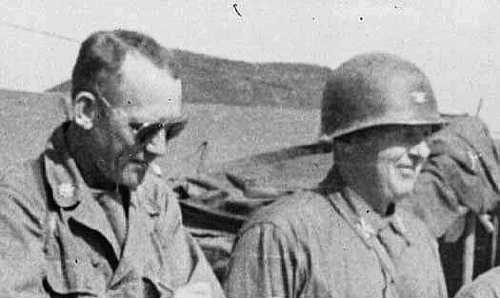
Major Anderson, S‐3, and Colonel MacLean in Pusan area before
sailing
to Iwon. Anderson was promoted to lieutenant colonel at
Untaek,
shortly before going to Chosin. ‐Photo by George Rasula.
==========
9 October 1950
This postal system
stinks. I even got a letter from the White
House ‐ but just advertising.
Today has been busy as it will be for
the next few days. Escue is now doing the
same work he was doing in
Yokohama [loading ships], as are Jack Brooks and the
others [of the
3d Battalion]. We still don't have a new commander yet as LTC
Reidy
is still in command, but I'm sure a bird colonel will arrive
soon.
[Names mentioned in letters of 8‐9 october: Maj Harvey Storms,
Lt
Robert McClay, Chaplain Connor, Lt Robert Boyer, Lt Gerald Clinton,
Lt
Fournier, Lt Skilley, of the 3d Battalion/31; Lt Richard Coke, Lt
Rolin Skilton, of
Hq/31.]
15 October 1950
[Lucy, who knew Seoul‐Inchon area
as well as most anyone
because of her tour there in 1948‐49, commented in
reference to the
Inchon‐Seoul coverage in the newspapers] ... So you think
the Marines
got all the glory? They may have in the newspapers, but they
sure
didn't on the ground not in military history. Remember
Nam‐san
Mountain? Well, our 32d Infantry Regiment went in to help the
Marines
‐ took the mountain and almost half of Seoul. I'm telling you,
it
hurt the Marine generals to no end to have the army come in and help
them out. The battle for the mountain was quite a fight and it did
turn the tide of
the Seoul operation.
17 October 1950
I finally got down to the
ship's PX tonight. We heard that
the 1st Cavalry Division and 25th Division
are closing in one
Pyongyang; wonderful news. Sgt Joe Wells [Op Sgt] and Cpl Choate
[S‐3
clerk] are here in the office talking about what a good S‐3 Maj
Olson
had been; we were sorry to have lost him [WIA near Suwon]. This Maj
Anderson may be a fair S‐3, but he sure has a lot to leaned about
handling
men. Lt Vincent was promoted to captain today; he's been
motor officer of the
1st Battalion since Camp Crawford. Cpt Clark
came in to take the TI&E job when
we left Yokohama for Inchon [troop
information and education was an S‐3
function at the time].
18 October 1950 [aboard ship]
Here are
the officers in our stateroom, a good group: Cpt
Hugh Robbins, Cpt Hasper, Chaplain
Hoehn, Cpt Clarke, Lt Racek, Lt
Escue and Cpt Alley, the artillery liaison officer.
Alley is a swell
guy and really knows his job, plus most of the jobs of anyone in
the
S‐3 Section. I don't know where Hasper gets it, but he passes
a
bottle around each day for a drink, a shot a day like a ration.
21 October 1950
Cpt Bowden our service company commander invited me down
to
his room for ice cream, two large gallon containers that he got from
one of the ships crew who was also present. The crew member said "I
can't
go into shore with you guys, but I sure can help while you are
on board this ship,
so if you need anything, just let me know."
23 October 1950
We are still here at Pusan. Just heard the news and it has
been the same for the
past few days, all good. Frank Bunn and George
Martin are here in the
wardroom.
24 October 1950
I was sicker than a dog last night;
not only me, but a dozen
of us. I had gone to the movie and during the first reel
my stomach
began acting up and after the second reel I felt as if I was about
to
explode at both ends; I just made it to the latrine (head) trying to
decide which end to put in the commo first. Seven out of eight in our
stateroom
were sick and the adjoining room also had the problem,
including McNally. The
merchant marine tried to blame it on the
water, while our regimental surgeon and
Cpt Wamble blame it on the
food or the waiters. By the way, a recent change makes
the medical
officer (Dr. Bitner) now in command of Medical Company, while
the
medical service officer (Cpt Wamble) is the executive officer. [There
must have been a change in regimental surgeons later at Untaek
because Dr. Galloway
was regimental surgeon when we went to the
Chosin.] Brown Sebastian (MSC) was
promoted to captain.
27 October 1950
[Note there is no mention
of the Eighth Army being attacked by the
Chinese on 25 October.] The 2d Battalion
was taken over by LTC Reidy
who was regimental executive officer when we left Camp
Crawford.
28 October 1950
Today at the lunch table the personnel
officer, Cpt Mitchell,
asked me if I was "George A. Rasula," so I told
him yes. He then
calmly said "you are now a captain." He got it from the
latest Army
Times printed two days ago in Tokyo. [Of interest is that
William
Dowell, then assistant S‐2, was also promoted on the same order.
I
learned at a recent reunion that both were born on the same day in
1922.]
30 October 1950
During our bull sessions the officers
continue to mimic the
way the S‐3 talks. It makes for a lot of fun, although
I hope the
major doesn't walk into the room when someone is carrying on
like
that. Oh well, it probably would be good for him. From talking with
majors Woods and Storms, I gather the man is disliked by many.
31 October
1950
Today we finally docked again for some exercise [long foot
march],
and again I was on the operational end so I didn't get the
exercise. Most of
the officers in our room were seen soaking their
feet in helmets when they
returned.
2 November 1950
I didn't write last tonight
because this floating mail box
was moving. We finally arrived at Iwon, North Korea.
I don't know how
long we'll remain on board. The difference when looking
out of the
porthole is that the mountains look a bit higher. The weather is
sure
a lot cooler, but there's no sign of snow here on the coast. I'm
sure
there is inland.
Finally dressed in OD uniforms and it sure does feel
good.
The parka and cold weather gear should take care of us if it gets
much colder. I get a kick out of the colonel when we meet in the
corridors or on
deck with his usual greeting "Good morning ...
captain!" with a beaming
smile. He's full of energy and puts on a
good show. His name is MacLean
[spelled MacClean in the original
letter].
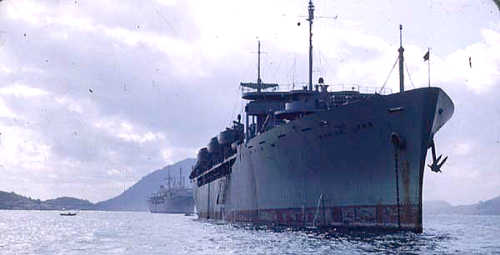
Ships off Iwon waiting orders to debark troops. Note mountainous
terrain in background. ‐Photo courtesy Joseph C. Rodgers, Med/31
3 November 1950
Still aboard, floating in the bay off Iwon
and still don't
know when we will get off. The chow and clean sheets are
better than
the C rations and hard ground. About midnight they awakened me to
do
some paper work until 0300 [drafting situation reports, called
"SitReps"].
4 November 1950
1030 hours. I'm still
aboard but should be getting off this
evening. After working again last night, I
should be getting
accustomed to little sleep now that we are going ashore.
1330 hours. Just got through taking a nice hot shower; our
shower is off so we went
to the colonel's stateroom since he's
ashore. Unloading is going slow. At
lunch I heard a fantastic story
of an incident that happened a few days ago. A
lieutenant was on a
recon with a group of men and was captured by some Chinese
commies.
The LT had served in China at one time so he made a deal with the
Chinese commander. The deal was the commies let them go, but they
said they had to
have evidence that they shot up an American patrol.
So the LT gave his carbine and
binoculars so the "chink" leader could
save face with the evidence to his
boss, and the LT and his men went
on their merry way, safe and sound. That sounds
like a wild tale,
it's true!
6 November 1950
Just
a short note because last night I arrived on shore and
will be going on a short
trip.
7 November 1950
We sure have covered a lot of ground since
I wrote that note
yesterday morning. After that I got on a truck and didn't
get to my
destination until about 2200 last night. And boy, it's one heck of
a
lot colder where we are now than it was on the beach. Felt chilly
when
we passed small creeks and saw ice along the edges. I think
they've had snow
already up here, but the sun melted it during the
day.
I saw Reilly,
Storms, McClay, Boyer and Robertson [of the 3d
Battalion] when I arrived here [at
Untaek]. I'm set up in the next
room [of the schoolhouse] and have coffee with
McClay quite often. At
times I wish I had my fiberglass parka and trousers,
they'd sure
come in handy here. The clothes I have now are good, but the gear
I
tested in Alaska was much better.
==========
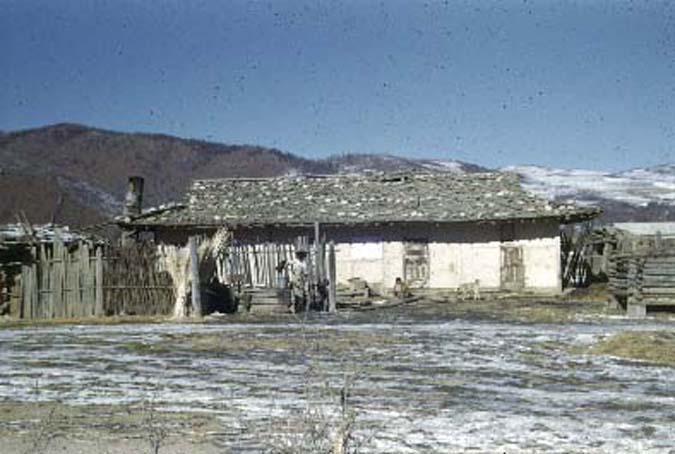
Winter comes early to this small village of Untaek on the Kaema
plateau, an area influenced by the climate of Manchuria and Siberia
to the
northwest. The location was selected as the command post of
RCT 31 due to
it's location on the road/trail from the division MSR
to the Fusen
(Pujon) Reservoir to the west, the operational area of
LTC Reilly's
3/31 Infantry. ‐Photo by George Rasula
==========
9 November 1950
Ole W.J. Reilly has
been itching for a fight and one of his
outfits did some tangling late yesterday
afternoon, and according to
the colonel [MacLean] they did very well. For many it
was their first
scrap. And naturally here in the CP, we were up with the ringing
of
phones keeping up with the situation. [Lt Donald E. Halverson of Item
Company 3/31 was the first officer of the regiment killed in North
Korea.]
The news ‐ the big picture ‐ is difficult for us to keep up
with. Cpt
Clarke, our TI&E officer, is getting his first mimeographed
news brief out
today. I hope those "wheels" up there [in Tokyo] get
this mess
straightened out. Hodges Escue loaned me his cot while he
makes his runs to
division, sure beats sleeping on that hard floor.
[We later began using white body
bags stuffed with rice straw.]
2355 hours. Finally have some peace and quiet around
this
place, for a while anyway. Most everyone has gone to sleep and I'm
on
duty. I wanted to use the typewriter but I thought it would make too
much noise, especially with a "bird" [MacLean] sleeping in one corner
of
the room and a "one star" [Hodes] in the opposite corner. Finally
shaved
for the first time in three days, also gave my only pair of
combat boots a rest and
put on the shoepacs; they're actually too
warm for indoor work, but they sure
feel good outside. It's getting
late, must try to catch some sleep over by the
stove.
12 November 1950
2300 hours. The weather sure is colder
tonight. Hodges Escue
came in about an hour ago from a long trip in an open jeep;
he sure
was cold! He said it was snowing and sleeting down the line. We
don't
expect any here because its clear and cold tonight.
==========
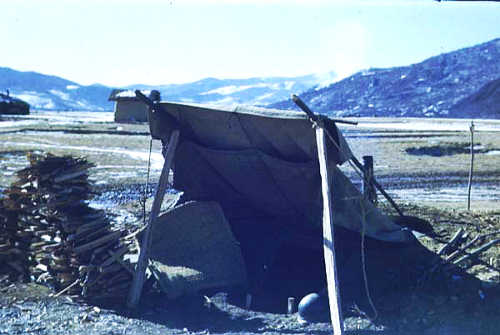
As the temperature drops the native ingenuity of the soldier
motivates them to make things better. Here they modified a root
cellar,
complete with makeshift stove and a good supply of wood.
‐Photo by
George Rasula
==========
14 November 1950
2330 hours. Just ate
some C rations. Choate is making some
coffee and Sgt Beddingfield is going to make
some hot cereal. It's
cold here, and I do mean just that. Last night Chaplain
Hoehn's
thermometer was 14 below zero and during the day it doesn't get
much
warmer because the wind blows so hard [wind chill]. We don't
have
snow on the ground yet, but they don't have much more than a foot
all
winter long [according to S‐2 weather data]. I consider myself
very
lucky to be working indoors most of the time.
Gen Barr was in for a
visit today so I prodded him with what
I thought we should have in the way of
clothing and equipment; and
gave his aide a list of the stuff. We are fairly well
equipped, but
not as well as we could be.
15 November
1950
2320 hours. Things got quiet rather early tonight. The old
man
[MacLean] has a bad cold and hit the sack early. Most of us have
colds but his is
bad. [The regimental surgeon had given him
medications and ordered the colonel to
bed, informing him he was
close to pneumonia. The weather was better today because
the wind
wasn't blowing; still pretty cold. Hodges Escue and Lex
Byers
returned tonight from the rear where they received their regular
army
physical exams; both passed.
16 November 1950
0200
hours (17 Nov.). Today we heard from LTC Olson who is at
Beaumont General Hospital
and reported doing well. He didn't lose his
arm as had been expected. He also
wrote to Maj Witte [S‐2] thanking
him for getting him evacuated so
fast.
==========
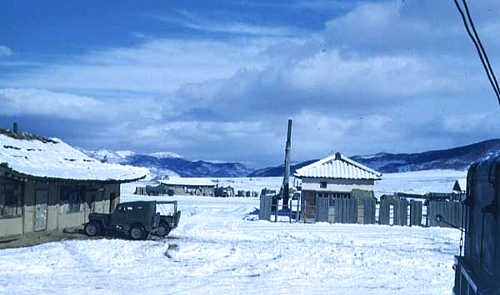
Weather data available to the command reported small amounts of
snow
on the Kaema plateau with temperatures as low as minus 40
degrees
Celsius (equal to minus 40 F.), although a normal cold was
about
minus 20 degrees. The coldest reports during November ‐
December 1950
were recorded in the Pukchong area, location of the 7th
Division CP.
‐Photo by George Rasula
==========
17 November 1950
I'm writing this
in the wee hours of the morning because I
had a lot of work because the S3 is
feeling sick and hit the sack at
supper time; I've been the S‐3 since
then.
The latest promotions: Bob McClay, George Martin and Bill
McNally
are now captains. Escue came back from McClay's location
[3/31] a few hours
ago and said Mac didn't know anything about his
promotion. It's snowing
tonight, has been since dark. Over at
Reilly's battalion [3/31] they have four
inches and it's getting
warmer.
18 November 1950
We have changed some of the enlisted working hours so Sgt
Wells is now on my
schedule. He's been playing poker during the
afternoons, said he's
nineteen hundred ahead.
More news tonight. Frank Fife [HHC commander] when
talking
with someone at G‐1 division found out that my boss, Maj
Anderson,
has been promoted to lieutenant colonel. There was plenty of
white
snow on the ground this noon when I was awakened, everything looked
cleaner. After lunch I took my camera out and photographed Old Glory
and the UN
flag in front of our headquarters with the mountains in
the background.
==========
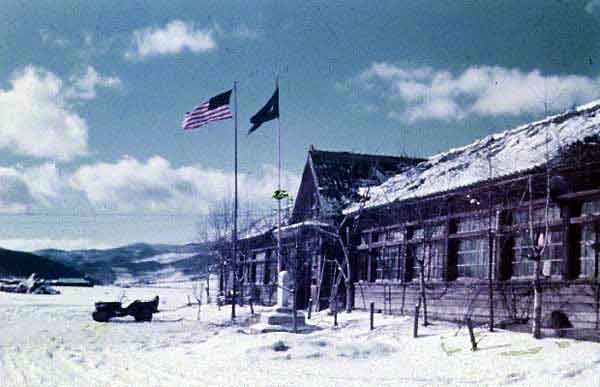
The schoolhouse at Untaek, as well as a similar building at the
Chosin, served as a good command post as long as the immediate area
was not
under enemy attack. In this case the classrooms housed the
Operations
Center ‐ nerve center of RCT operations ‐ as well as a
communications center and the officer's mess. ‐Photo by George Rasula
==========
19 NOVEMBER 1950
The day has been quiet
and the weather not too cold for a
change. The sun was shining but didn't melt
the snow. Saw Gerald
Clinton today, he had just come out of the hospital (just
sick) and
was heading back to the battalion [3/31].
20 November
1950
Bob McClay came here for the night, so we should see the rest
of the
gang [3/31] in a day or so.
This [enclosed] is a 20 Nov. spot report with a
news
clipping. It never fails when they take photos. This is LTC Reilly
with Gen Almond and not Col MacLean as stated in the caption, even
though it
doesn't look too much like "Bill." [This has added
confusion to the
Chosin story when one author reported ‐ based on the
photograph taken near
Untaek ‐ that Almond, after visiting 1/32, went
to 3/31 at the Inlet where
he decorated Reilly.]
==========
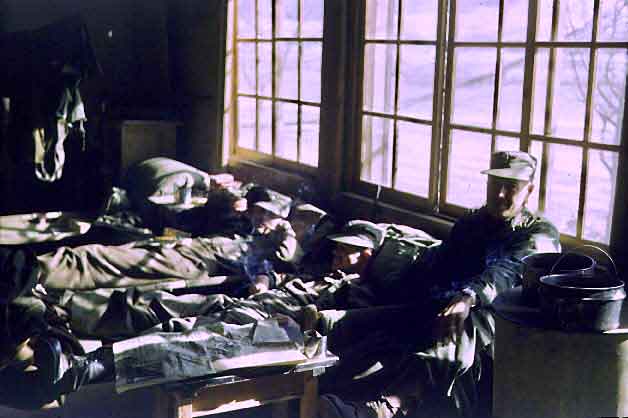
Sitting next to the stove in the officer's bunk room is
Captain
Ronald Alley, an artillery officer from 57th FA Battalion who was
the
RCT fire support coordinator. When the RCT moved to the Chosin he
was
at the CP of the 57th FA Battalion at the time the Chinese
attacked.
During the action at the Inlet he was captured. After
repatriation he
was accused of collaborating with the enemy, faced court
martial and
was imprisoned at Leavenworth. See "A Soldier's
Disgrace," by Don J.
Snyderyaknee Books, 1987. ‐Photo by George
Rasula
==========
21 November 1950
Today was the first
time I've been able to relax since I got
off the ship. Today the ole man and
Anderson went to division for the
better part of the day [for briefings based on X
Corps plans at the
time], so I went out and took some pictures and got to shake out
my
gear. This afternoon I went over to visit Lt Newberry, the assistant
motor officer and friend of mine. Had a few drinks of CC cocktail
style ‐
whiskey and water in a canteen cup. After supper I was back
to the CP to work on my
reports that took very little time as we are
doing little to nothing at present.
The news clippings I sent about
the 17th Infantry showed the outfit that's on
the move. And now they
are probably washing their dirty socks in the Yalu River, as
Sgt
Wells puts it. Lt Bill Racek takes over duty tonight, so I'll get
some sleep.
22 November 1950
2340 hours. It's already past
time to wake up Hodges Escue
who is taking over the next shift. The latest poop is
the turkeys
should arrive tonight.
END NOTES
This is the last letter written prior to the move to Chosin.
I'm quite sure I
had written a few more before leaving Untaek,
although they probably ended up in
the mail clerk's bag and lost at
Chosin. However, as soon as we received the
warning order for the
move to Chosin there was little time for letter writing. Lt
Dowell
and I left Untaek on 25 November, arriving east of the reservoir on
the 26th where we immediately went to work planning and writing RCT
31 Operation
Order 25 that never did materialize as an attack; the
Chinese attacked
first.
==========
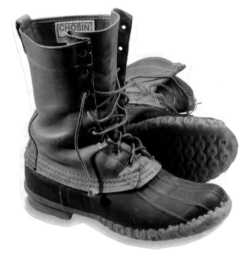
‐Photo by George
Rasula
==========
|








